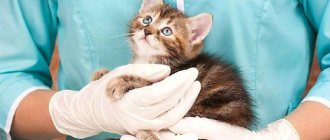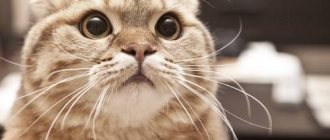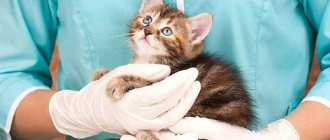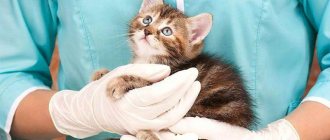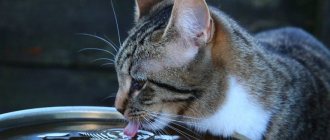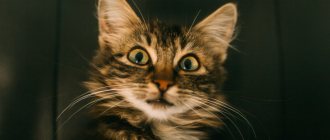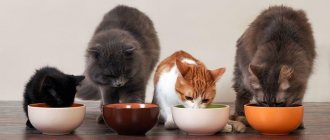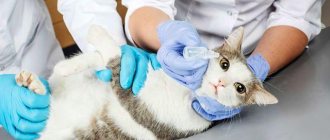If a cat does not eat or drink for two or three days, and it is clearly noticeable that the animal is weakening and its condition is rapidly deteriorating, it is necessary to urgently take the pet to the hospital and find out the causes of this pathological condition. Often, lack of appetite and general poor health are associated with some internal disorders, so it is dangerous to self-medicate with such symptoms.
How does the condition manifest?
In cats, periods of increased activity are usually followed by apathy and drowsiness. It is difficult for owners to understand why and at what exact moments this happens. Therefore, a situation where a cat is lethargic, hardly eats and sleeps a lot, is alarming.
The owner should clearly know that poor appetite and less active behavior do not always indicate an animal illness. And the veterinarian is sometimes unable to understand why the cat is lethargic. The observations of an attentive and loving owner are extremely important here.
The main signs of cat health, in addition to good appetite and good spirits, are:
- shiny and smooth coat;
- pink and slightly moistened mucous membranes;
- cold and slightly damp nose (normally, during sleep it can become warm and dry);
- pulse, respiratory rate and temperature are within normal limits;
- absence of excessive discharge from the eyes, ears and nose, plaque in the mouth, salivation and unpleasant odor from the mouth and ears.
It is important! The normal duration of rest for a cat per day is 12-14 hours or more.
When should you not postpone a visit to the doctor if your cat is not eating?
Indications for immediate contact with a veterinarian are the following combination of symptoms:
- refusal to feed continues for more than 2 days, and for a kitten – one day;
- the cat does not eat or drink;
- the pet constantly licks itself;
- constant vomiting, drooling;
- diarrhea or constipation;
- skin rashes appeared;
- dry nose in combination with conjunctivitis and rhinitis;
- dry nose and increased or decreased body temperature.
Possible causes of lethargy in healthy animals
Often there are reasons why a cat is lethargic, sleeps all the time and eats little, but it is better to understand each of them in order.
Stress
It is not uncommon for a cat to eat poorly and sleep a lot after a serious nervous shock.
Cats are very sensitive animals, so they have many causes of stress:
- travel by car;
- the arrival of a new family member or pet in the house;
- change of owner;
- repair or rearrangement of the house;
- visit to the veterinarian;
- change of place of residence by owners;
- lack of attention from the owner;
- pain;
- recent surgery;
- visit of guests;
- bathing and other hygiene procedures;
- changes in daily routine;
- the appearance of new and unusual objects in the house;
- first time on the street.
Usually cats cope with this situation quite well without medical help, but they really need the support of their beloved owner. However, in some particularly susceptible cats, stress lasts for quite a long time and can even be harmful to health.
The main physiological signs of nervous shock in a cat:
- urinary incontinence;
- rapid breathing;
- diarrhea or constipation;
- increased cleanliness (a cat can lick itself until bald spots appear on its fur and irritation on the skin);
- yawning too often;
- urinating in inappropriate places (the cat is marking its territory).
It is important! If, as a result of stress, the cat’s behavior does not return to normal for a long time, it is better to show the animal to a doctor. After all, nervous shocks can negatively affect his health and lead to the development of diabetes, skin diseases and disturbances in the functioning of the cardiovascular, digestive and genitourinary systems.
Change of feed
Often the cause of a lethargic state and refusal to eat is a change in diet (for example, switching from natural food to ready-made food and vice versa).
In this situation, you should return the cat to its previous food and treat it with some treat. Then the restoration of appetite and a cheerful state will occur very quickly.
Hot weather
Cats do not have sweat glands. They do not know how to cool themselves by opening their mouths, like dogs. Therefore, in the heat, to protect themselves from overheating, furry pets try to lie more in cool places. In addition, they begin to eat less so as not to waste energy on burning calories received with food.
Age
Over time, many owners begin to worry that their once active and nimble cat has become lethargic, eating almost nothing and lying around all the time. This is easy to explain: older cats no longer have as much energy for play; they sleep longer and more soundly than young animals.
If an elderly pet is lethargic, eats without appetite and sleeps a lot, but at the same time drinks water and has the above signs of a healthy cat, then there is no need to worry. However, an older cat should be regularly taken to the veterinarian for examinations to prevent the development of diseases.
Kittens spend almost 90% of the day sleeping until they reach two months of age. If the kitten is lethargic, plays little and eats poorly during periods of wakefulness, then the best solution is a trip to the veterinarian.
It is important! The maximum duration of healthy fasting for kittens is 1 day, for young cats and middle-aged pets – 3 days, and for “old people” – 2 days. If after this time the cat still does not start eating, you need to consult a doctor as soon as possible.
Pregnancy
In the early stages of pregnancy, many cats, like people, suffer from toxicosis. They become lethargic, try to move less and more carefully, sleep more and often refuse to feed.
If a cat was mated 3-4 weeks before this condition, then after another 5-6 weeks you can expect an addition to the cat family.
A number of other reasons
There are several other factors why a cat does not eat anything and only drinks water.:
- wrong diet. Perhaps the cat simply does not like the food that the owner offers him. Change the dishes and look at the cat's reaction;
- stressful situations. When changing place of residence or owner, the cat may become confused and miss the old way of life. Usually such nostalgia lasts a day or two. Then everything passes, and the cat is drawn into a new life;
- insufficient hygiene of cat dishes or food. People wash dishes after every meal. It will also be unpleasant for the animal to eat food that has disappeared, covered with mold and ants, or from a dirty bowl that has not been washed for a long time. Wash the saucer and evaluate the result;
- changing the location of the bowl. Put the saucer back in its original place and check if this is the problem;
- manifestation of character. Sometimes cats are just spoiled and mischief for any reason. Be patient for a day or two. The cat will get tired of this, he will get hungry and stop showing off. The main thing is not to force the animal to eat. The pet must drink water at this time;
- seasonal changes. In the summer, the cat refuses to eat, since food generates heat from inside the pet, which will be very unnecessary at that time of year. For three days, a cat can eat almost nothing, guided by its own well-being and instincts. The only salvation for the animal during this period is to drink water;
- fasting day. When an animal has eaten too much, it may not eat for the next few days, resting from meals;
- fur accumulated in the intestines. This may cause vomiting and constipation. Buy anti-hair medications for your cat at the pharmacy.
- beginning of sexual activity. The cat does not eat anything, but only drinks water, since she has only suitors on her mind, and cats have only continuous searches for their loved ones. This period of active life lasts several days. Then everything goes away;
Important! Pay attention to the age of the cat. If a young animal does not eat, but only drinks, it will survive for a maximum of a week, depending on the condition of the cat’s body.
If this is a kitten, do not allow it to eat anything for more than a day. But during these days he must drink water.
© shutterstock
An old cat will lie down more, eat nothing, drink water - this way he will last a maximum of three days.
Possible pathological conditions
If the cat has been lethargic for several days, sleeps a lot, drinks and eats poorly, and can barely walk, the owner should under no circumstances let the situation take its course. Such a condition in the pet’s body most likely signals the development of a serious disease. The cat must be shown to a doctor in the next few hours.
Anemia
Anemia occurs when a cat's body produces less red blood cells and hemoglobin.
In addition to the fact that with anemia, a cat is lethargic and sad, it also exhibits other signs of this unpleasant disease:
- the nose becomes lighter;
- mucous membranes acquire a bluish tint;
- blood pressure decreases;
- the pulse is sometimes rapid, sometimes rare;
- breathing accelerates, shortness of breath appears;
- the fur becomes dull and may fall out;
- clear discharge appears from the nose.
Diseases of the cardiovascular system
If the cat eats poorly and constantly sleeps, is lethargic, tries to walk less - these may be signs of the development of a disease of the cardiovascular system.
Your pet may be bothered by fluctuations in blood pressure.
It is important! Normally, blood pressure in cats can “jump” from 105/65 to 135/95 mmHg.
With high blood pressure, furry couch potatoes experience:
- lethargy;
- decreased vision (while moving, the cat may bump into furniture and other objects);
- rapid pulse;
- dilated pupils;
- redness of the eyes;
- sometimes vomiting;
- in some cases - nosebleeds.
With low blood pressure, the pet refuses to eat due to nausea, sleeps a lot, its pulse slows down, and the cat may even lose consciousness.
In acute heart failure, the animal is also lethargic, its breathing becomes difficult, shortness of breath and bluish discharge from the nose appear.
An important symptom of the development of heart disease in a cat is its characteristic posture in a relaxed state. She usually stands with her front legs spread wide. This makes it easier for her to breathe.
Gastrointestinal diseases
Often the cause of a pet's lethargic and sleepy state and his refusal to eat are diseases of the gastrointestinal tract.
With gastrointestinal pathologies, a cat may exhibit symptoms:
- bloating;
- stools that are very dark, almost black, or mixed with blood and mucus;
- belching;
- constipation;
- flatulence.
Diseases of the urinary system
The development of urinary system diseases in cats, in addition to a lethargic state and lack of appetite, is accompanied by symptoms:
- too frequent or infrequent urination, or its complete absence;
- constant pain when urinating;
- the appearance of blood or pus in the urine;
- sweetish smell from the mouth;
- lower back pain;
- extremely unpleasant odor of urine.
To reduce pain at least a little, the animal lies down almost all the time, does not drink or eat.
It is important! If your pet has a blockage in the urethra, without medical attention he may die within 3 days.
Infectious diseases
In many cases, a cat’s lethargic behavior, refusal to feed and staying in almost constant sleep indicate an infectious disease.
Such diseases are extremely dangerous for cats and require immediate medical attention. The owner must remember that the life of his pet is literally counted in minutes.
The most dangerous infectious diseases that cause cats to become very lethargic are:
- Leptospirosis: Caused by the bacterium Leptospira. The disease affects almost all cat organs and is very dangerous for humans;
- Calcivirosis is a viral disease that affects the respiratory tract. It occurs mainly in cats under 2 years of age, but sometimes in older individuals;
- FIV is feline viral immunodeficiency: an extremely dangerous disease that affects the immune and nervous systems. Only representatives of the cat family, including wild representatives, can become infected with it;
- Panleukopenia (popularly called feline distemper) is a deadly disease that develops very quickly. It affects the cardiovascular, digestive and respiratory systems of the cat and is accompanied by intoxication of the entire body;
- herpes virus infection (another name is rhinotracheitis): caused by the feline herpes virus. Affects the respiratory and visual organs. If the animal is weakened by other diseases and does not receive proper treatment, the infection can lead to death.
The main signs of a cat becoming infected with a dangerous infection:
- lethargy and apathy;
- lack of appetite;
- high body temperature (above 40°C);
It is important! Normal body temperature in adult cats is 38-39°C, in small kittens – 38-39.6°C, in sphinxes – 38-41.5°C.
- labored breathing;
- cough and wheezing;
- vomit;
- foul, greenish diarrhea;
- bloody discharge from the mouth, nose, ears, eyes;
- soreness in some parts of the body.
Intoxication
Poisoning of the body (intoxication) in cats, in addition to lethargy and refusal to eat, is indicated by:
- diarrhea;
- vomit;
- increased salivation;
- increase or decrease in body temperature;
- redness or blueness of mucous membranes;
- constant feeling of thirst;
- convulsions and so on.
If you suspect poisoning, you should try to induce vomiting in the cat so that the body can at least partially get rid of toxins, and then take it to the veterinarian.
However, if more than 2.5 hours have passed since the poisoning, it is better to transport the pet to a veterinary hospital as soon as possible. After all, during this time, toxic substances have already spread throughout the circulatory system throughout the body.
In order to protect your furry pets from intoxication, you need to know its main causes:
- stale or poor quality food;
- contaminated drinking water;
- bites of snakes and poisonous insects;
- helminth infection;
- bacterial and viral infections;
- violation of hygiene rules when keeping animals;
- eating poisonous plants, fertilizers, chemicals;
- uncontrolled use of medications;
- individual intolerance to certain components of feed, hygiene products, etc.;
- exposure to toxic fumes from paint and varnish products.
Parasites
The cause of lethargic behavior and drowsiness can be a cat’s infection with external and internal parasites (fleas, ticks, worms).
Flea and tick bites cause itching and pain in cats. As a result, due to constant scratching, wounds appear on the skin, and the hair begins to fall out.
A cat with ear mites often shakes its head and scratches its ears, in which a lot of wax with an unpleasant odor can be found.
Cats infected with worms are often lethargic. Other signs of the disease:
- bowel disorder (diarrhea or constipation);
- vomit;
- itching and irritation in the anal area;
- temperature increase;
- bloating;
- the presence of eggs and particles of worms in the feces.
If external or internal parasites are detected in your pet, you need to begin exterminating them as soon as possible. The veterinarian will prescribe the medications.
The fight against parasites is very important, because they are quickly transmitted to both other animals and humans.
What does it mean for a pet to refuse food and drink?
There are times when a cat does not eat for several days, and at first glance it is difficult to say what is causing this. When a kitten has no appetite , it is often said that he has anorexia. Moreover, unlike hunger, which manifests itself due to the physiological characteristics of the body, anorexia is associated with psychological factors.
This condition can be provoked by many reasons, due to which the cat may lose its appetite for a long time. In a kitten, it can be observed when certain disorders occur in its body that contribute to the development of the disease. If the kitten does not show its former activity , does not eat or drink for several days and does not leave its place, then it can be assumed that it has problems with the stomach or other important organs. It's hard to imagine that a cat that experiences unpleasant pain every minute will think about food.
Another reason that may be associated with a cat's lethargic behavior is the first heat. The owner may mistake this condition for a disease . For the animal, this is the first experience when it feels natural urges, so it may behave confused. Usually the kitten behaves this way only for a few days, but then it becomes cheerful and active again.
If for two or three days you observe how the kitten does not want to eat, but only sleeps, then some kind of illness has probably come down on it. Lack of appetite is often associated with the development of infectious diseases, for example, the appearance of worms. To prevent such situations, it is advisable to periodically give him special drugs against helminths for preventive purposes.
Among the entire list of diseases, we can highlight the most common ones in domestic cats. Keep in mind that if your pet does not eat for several days , remains lethargic, and is losing weight , then you can be sure that it is some kind of illness. And first of all, you need to find out what infection caused this condition and what needs to be done.
A kitten may begin to lose weight during diseases of the gastrointestinal tract. Characteristic symptoms of this disease are diarrhea and other unconventional discharge. But to be sure that this is the disease, you should show it to a veterinarian, who can make a more accurate diagnosis.
Liver disease is also common in cats. Any change in the cat's behavior is a signal for the owner to take him to the veterinarian to be sure that nothing threatens him. To prevent this from happening again , you must be more attentive to what you feed the kitten. His diet must contain foods that can cleanse this organ.
- Diseases of the pancreas. Some animals may lack appetite precisely because of the development of this disease.
- Diseases of the reproductive system.
- Blood diseases.
- Along with the above reasons, a kitten may refuse water and food due to diseases of the mucous system - throat, nose, mouth, etc.
Other reasons
If a cat does not eat for a long time, this should not be immediately perceived as a sign of an incipient disease. It is possible that weight loss may be due to the following reasons:
- The kitten did not like the new food;
- When changing your place of residence. It often happens that cats do not immediately get used to a new place. To speed up the adaptation period, you can use special medications that help animals when moving.
- Stress arising from various reasons.
Be that as it may, if your cat has no appetite during the day, you should not panic and wonder what to do. If your pet's condition does not change over a longer period of time, then you should take him to the veterinarian . But here too there are some peculiarities. In order not to worry ahead of time about the health of the kitten, it will be useful for you to familiarize yourself with the following information:
- If you have a young and healthy cat, he can go without eating and still feel quite well for 5 days. If after this time his appetite returns, he will be able to quickly replenish the need for all the necessary vitamins and carbohydrates and will again become cheerful and active.
- If you have an older cat living in your apartment who has lost his appetite, keep in mind that he can go without food for no more than 3 days. If the matter is limited to this, and after this period his appetite awakens, then he will be able to quickly recover. But he will be able to return to his usual lifestyle only if this was not caused by a diet.
- If a similar situation happens to a small kitten who refuses to eat all day long, know that this is dangerous for his health and can result in death. The kitten does not have a sufficient supply of substances to survive without food for more than a day. Therefore, if you notice that your pet refuses breakfast, then you should immediately take action.
- Owners who keep cats with chronic diseases need to be especially attentive to their pets. Prolonged fasting is extremely contraindicated for them. And no matter what time the disease appears, you must do everything possible to ensure that the kitten does not go hungry for more than 2 days.
Other pathologies
In addition to the listed pathological conditions of cats, accompanied by lethargy, drowsiness and loss of appetite, the following painful conditions also occur:
- disturbances in the functioning of the endocrine system.
For example, after sterilization or childbirth due to hormonal imbalance, cats become lethargic and inactive.
Pets suffering from diabetes also do not want to move too much. In addition, such cats are constantly thirsty, eat a lot or very little, and often go to the toilet. They experience weight fluctuations, their vision deteriorates, their stomach enlarges, their muscles weaken;
- oncological diseases.
One of their symptoms in cats is a lethargic state. Changes in the pet’s well-being are clearly visible: the cat hardly eats, lies down all the time, vomits, and experiences internal bleeding. Such animals have very unpleasant breath, and upon visual examination, swelling and ulcers can be detected on the body;
- diseases of the musculoskeletal system.
Even an inexperienced owner can easily recognize them. With arthritis, dislocations, sprains, osteochondrosis, fractures and other problems, animals become lethargic, try to eat and move less. Cats' affected joints swell, they limp, rarely sharpen their claws and wash themselves. All movements cause them pain;
- complications after surgery.
Usually, in the first three days after the intervention, cats are very lethargic. This condition, in the presence of appetite and thirst, is considered normal.
But, if the animal’s temperature rises, blood or pus begins to ooze from the wound, vomiting or constipation often occurs - you need to contact the clinic as soon as possible. After all, these can be dangerous symptoms of suture dehiscence or suppuration, or the formation of a hernia.
A cat doesn’t eat, just drinks water and sleeps—is it normal or pathological?
It all depends on the presence of additional symptoms. The pet is being watched. In most cases, the situation normalizes itself and the animal becomes active again and begins to eat.
When lack of appetite is accompanied by thirst and polyuria, testing for diabetes mellitus or other chronic diseases should be performed.


